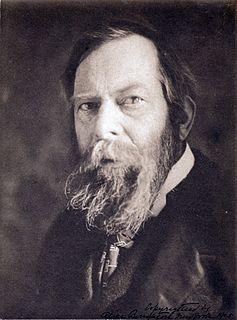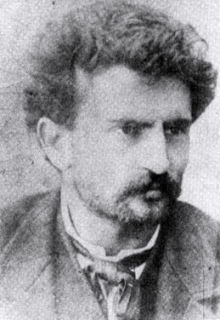A Quote by Marcel Proust
The reason why a work of genius is not easily admired from the first is that the man who has created it is extraordinary, that few other men resemble him. It is his work itself that, by fertilising the rare minds capable of understanding it, will make them increase and multiply.
Related Quotes
A man of genius is not a man who sees more than other men do. On the contrary, it is very often found that he is absentminded andobserves much less than other people.... Why is it that the public have such an exaggerated respect for him--after he is dead? The reason is that the man of genius understands the importance of the few things he sees.
Let the awe [the teacher] has upon [children's] minds be so tempered with the constant marks of tenderness and good will, that affection may spur them to their duty, and make them find a pleasure in complying with his dictates. This will bring them with satisfaction to their tutor; make them hearken to him, as to one who is their friend, that cherishes them, and takes pains for their good; this will keep their thoughts easy and free, whilst they are with him, the only temper wherein the mind is capable of receiving new information, and of admitting into itself those impressions.
One would wonder to hear skeptical men disputing for the reason of animals, and telling us it is only our pride and prejudices that will not allow them the use of that faculty. Reason shows itself in all occurrences of life; whereas the brute makes no discovery of such a talent, but in what immediately regards his own preservation, or the continuance of his species. Animals in their generation are wiser than the sons of men; but their wisdom is confined to a few particulars, and lies in a very narrow compass. Take a brute out of his instinct, and you find him wholly deprived of understanding.
A nation orients itself by its own geniuses, and derives from them its ideas of its own ideals, but the guiding star serves also as a light to other nations. As speech has been created by a few great men, the most extraordinary wisdom lies concealed in it, a wisdom which reveals itself to a few ardent explorers but which is usually overlooked by the stupid professional philologists.
An ordinary man will work every day for a year at shoveling dirt to support his body, or a family of bodies; but he is an extraordinary man who will work a whole day in a year for the support of his soul. Even the priests, men of God, so called, for the most part confess that they work for the support of the body.
Why prove to a man he is wrong? Is that going to make him like you? Why not let him save face? He didn't ask for your opinion. He didn't want it. Why argue with him? You can't win an argument, because if you lose, you lose it; and if you win it, you lose it. Why? You will feel fine. But what about him? You have made him feel inferior, you hurt his pride, insult his intelligence, his judgment, and his self-respect, and he'll resent your triumph. That will make him strike back, but it will never make him want to change his mind. A man convinced against his will is of the same opinion still.
It is the first vision that counts. The artist has only to remain true to his dream and it will possess his work in such a manner that it will resemble the work of no other... for no two visions are alike, and those who reach the heights have all toiled up steep mountains by a different route. To each has been revealed a different panorama.
The great genius does not let his work be determined by the concrete finite conditions that surround him, whilst it is from these that the work of the statesman takes its direction and its termination. ... It is the genius in reality and not the other who is the creator of history, for it is only the genius who is outside and unconditioned by history.
Have I then no work to work in this great matter of my pardon? None. What work canst thou work? What work of thine can buy forgiveness or make thee fit for the Divine favour? What work has God bidden thee work in order to obtain salvation? None. His Word is very plain and easy to be understood, "To him that worketh not, but believeth in Him that justifieth the ungodly, his faith is counted for righteousness" (Rom. 4:5). There is but one work by which a man can be saved. That work is not thine, but the work of the Son of God. That work is finished.
... the reason why there are so few first-class poets is that many people have intense feelings or first-class minds but to get the two together so that you will be willing to put a poem through sixty drafts, to be that self-critical, to keep breaking it down, that is what is rare. Right now most poetry is just self-indulgence.
Men should soon make up their minds to be forgotten, and look about them, or within them, for some higher motive in what they do than the approbation of men, which is fame, namely, their duty; that they should be constantly and quietly at work, each in his sphere, regardless of effects, and leaving their fame to take care of itself.
This great increase of the quantity of work which, in consequence of the division of labour, the same number of people are capable of performing, is owing to three different circumstances; first, to the increase of dexterity in every particular workman; secondly, to the saving of the time which is commonly lost in passing from one species of work to another; and lastly, to the invention of a great number of machines which facilitate and abridge labour, and enable one man to do the work of many.
The question may seem embarrassing, but it can be answered in a few words. For two people to live in peace they must both want peace; if one of them insists on using force to oblige the other to work for him and serve him, then the other, if he wishes to retain his dignity as a man and not be reduced to abject slavery, will be obliged in spite of his love of peace, to resist force with adequate means.
I think men of science as well as other men need to learn from Christ, and I think Christians whose minds are scientific are bound to study science that their view of the glory of God may be as extensive as their being is capable. But I think that the results which each man arrives at in his attempts to harmonize his science with his Christianity ought not to be regarded as having any significance except to the man himself, and to him only for a time, and should not receive the stamp of a society.





































